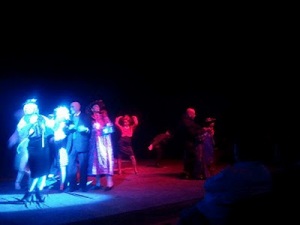
Art has always been feared by dictators for its silent and devastating property of exposing the occult. Because it is the messenger pigeon that conveys the feeling of the people, their fears and hopes. It also has the power to move public opinions and to help displace the warlords.
The response of totalitarian governments, as in Cuba, is the constant harassment of artists from multiple variants. Fear is the best weapon to quell the diverse manners of creation. Criticism through Art is an effective weapon of the transformation process, it is the nature of creation. The Artist, through his contradictions and doubts, struggles internally with what is best for Art, society, and against himself (this should be the logical order of creation), since from the beginning the Ruler and his sycophants molest him, he will be target of attacks to return him to the fold, and to begin the process of self-censorship.
But Art is not manipulated, it overcomes fears and future reprisals, because it is the same need arises in one’s freedom to issue a transparent proposal and only for the artistic, that even thrives and succeeds before any attempt to suffocate it.
In the cosmos of creative expressions, the Plastic Arts attack the megalomania of the Castro family. Much of the grief of a nation is constantly consumed, is found in the canvases of contemporary Cuban painters. Music is occupies a prominent place in the offensive against the totalitarian system, with lyrics that criticize the challenges of a society that survives broken and vigilant.
Among all the arts literature is the disadvantaged, perhaps because it is the most dangerous, according to universal history. If the writers that suggest it could become manipulators, from one side or the other, of the national reality, for this they would merit attention from the powers-that-be. A constant criticism of our generation is that we assume the role of the press.
We occupy the action of real events (no exaggeration, remember socialist realism), and supposedly, according to critics (official), the writer is clearly a storyteller. Many writers let themselves rise. The most you can get from them is silence, in apparently “support” of the system although in the depths of their being they hate it.
For its part, Cinema bets on an art film without political commitment. Of the Arts it is the most convincing, but the high cost of production decreases its chance of fighting in the social scene.
Among the Performing Arts, Theater deserves an aside, it is the most immediate and tangible for its ephemeral format palpable in time, but in turn it is the imprint of the thinking citizen who interacts with social events which the media silences.
The “Bertolt Brecht Theatre,” for two months, provides the setting “Our Village,” version and direction by Juan Carlos Cremata Malberti with his project “The Sugar Refinery” based on “Our Town” by the American Thornton Wilder.
Cremata has the ingenuity to contextualize the work and bringing it to our reality, offers us an amazing actuality that, through the skillful management of emotions, exposes us to the most ordinary needs, creating a show which fuses with an excellent illumination, music, circus art and dance, until they sprout vibrations and feelings, in the act of receiving and returning to the public what only theater can fully achieve, and that leads us to pursue every movement and wink between light and shadow that at times delights, and others gives us a lugubrious aura of the smoke and hollow of a world we resist entering, but that ultimately we are drawn into its interior, grateful, from the moment of realization, for the compelling performances of the actresses and actors, the complicity of the technical team who, at some point from their airy corridors, conspire with its characters.
The Director again turns our attention to the living generation, aging, death and childhood, with all that dramatic premise without leaving the popular mockery, the joke, releasing his actors not to be confined to a tight script, and providing the possibility of improvisation.
The story, in three acts, follows the life of Emily, who is the love of George, his neighbor and schoolmate, whom she later marries, and in the second act she dies; and who then asks to return, she wants to exist among the living even one day because she misses her son, her husband, home, and despite the advice of relatives who live in the land of dead who tell her not to return.
Emily returns, picking up on the day of her twelfth birthday, but discovers that the pain is even greater, it becomes unbearable to remember, to live outside time knowing that we must return, to that place that definitely is no longer among the living. So she asks to return before the end of the day, finding that “the living do not understand death,” she, meanwhile, she has also failed to understand the living, her languages and perspectives are no longer the same.
With the particularity that in Cuba the difficulties are multiplied when compared to the rest of the world, recognizing our reality convulses and the times where we live with such haste, provide a work stages in three hours that seem impossible to achieve, however “Our Village ” won over in most ways an audience eager and excited, that gave it a standing ovation and thanked the immense artistic effort of the cast and crew, no doubt, a sign of success.
Of course, many laughs and tears about the reality that surrounds us, as all roads lead to Rome, in Cuba all lead to covert censorship, the proof being the absence of any official representative of Cuban culture. Despite that their seats have remained vacant waiting for the dark shadows of the functionaries, they occupy the space of creation without limit or fears, that in hopes of achieving transparency and creativity, with ARTE, the deepest and most international of languages, which even manage to pull from its viewers their joys, fears and sorrows.
And we left the theater with this emotional richness for which we will forever be grateful.
March 11 2012



